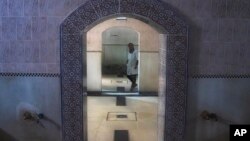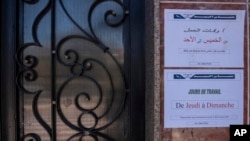For years, Fatima Mhattar has welcomed shopkeepers, students, bankers and retirees to the Hammam El Majd public bathhouse on the outskirts of Morocco’s capital, Rabat. For a change, they relax in a mist of steam before scrubbing and rinsing with their friends and neighbors.
Public baths (hamam in Arabic) have been part of Moroccan life for centuries. In their domed rooms, men and women, regardless of social class, mingle and relax together. Bathers sit on the stone slabs beneath the mosaic tiles, lather up with traditional black soap, and then rinse with scalding water from a plastic bucket.
But they are the latest victims as Morocco faces unprecedented threats from climate change and what officials call a catastrophic six-year drought. This year, cities across the North African country have ordered hammams to be closed three days a week to conserve water.
On a recent Sunday, Mkhatar smiled as she greeted families hauling 10-liter buckets filled with towels, sandals and other bathing supplies to the hammam, where she works as a receptionist. But she worries the restrictions will limit the number of customers and cut into her salary.
“Even if it is open from Thursday to Sunday, most customers will avoid coming because they are worried about crowds inside,” Mhattar said.
Declining rainfall and rising temperatures are causing Morocco’s largest reservoir to shrink, terrifying farmers and municipalities who depend on the water. The country is making painful choices as it grapples with climate change and drought.
The decision to impose restrictions on businesses such as hammams and car washes angered some. Hammam enthusiasts and politicians alike say the government is picking winners and losers by choosing not to ration water to upscale hotels, swimming pools, spas or the agricultural sector that consumes most of Morocco’s water.
Fatima Zahra Bata, a member of the Moroccan House of Representatives, asked Interior Minister Abdelouafi Laftit: “This measure does not seem to do much good, especially because ( The hammam (hamam) sector is not considered to be one of the sectors that consumes the most water,” written questions were asked last month.
Barta asked why officials in many cities have made exceptions for spas, which are typically used by wealthy people and tourists. She warned that the hammam closures would “increase the vulnerability and suffering of this class of people, whose monthly income will not exceed Dh2,000 or Dh3,000 at best.” Hammam workers earn the equivalent of $200 to $300.
Raftit has yet to respond, and his office did not respond to questions from The Associated Press.
The closures affect around 200,000 people directly or indirectly employed in the hammam sector, which accounts for about 2% of the country’s total water consumption, according to Morocco’s National Institute of Statistics.
Turkish baths in cities including Casablanca, Tangier and Beni Mellal have been closed since the interior minister asked local officials to implement water conservation measures earlier this year. As heating gas prices rise and temperatures drop, the closure of towns high in the Atlas Mountains, where people go to hammams to stay warm, is of particular concern.
Mustapha Baradine, a carpenter in Rabat, enjoys enjoying the hammam every week with his family, but he doesn’t understand the consequences of the small amount of water he uses during a drought. For him, the closures stoked resentment and raised questions about wealth, poverty and political power.
“My kids and I only used two buckets of water,” he said. “I don’t like this decision at all. It would be better if they could empty the pool,” he said of local officials.
Morocco’s poverty rate has declined in recent years, but income inequality still plagues rural and urban areas. Despite rapid economic growth in some sectors, protests over income disparity and rising costs of living have historically been common among the working class.
Morocco’s neighbors have chosen to ration water in different ways. Last year, in Tunisia, taps throughout neighborhoods were shut off for several hours every day. In parts of Spain last summer, communities were banned from washing cars, filling swimming pools and watering gardens.
Fatima Fedouachi, president of the Casablanca Hammam Owners Association, said the closure of the hammams changed the economics of operating a hammam business. While the Hammam Association has yet to publish statistics on job losses or lost income, they have warned of the impact on owners, chimney technicians and receptionists.
“Owners have an obligation to perform their duties for workers,” Fedouachi said.
Even on days when they are closed, most hammams continue to burn wood to keep the baths warm, rather than letting them cool down and heat them up again, Fedoachi said. She added that owners would prefer to ration at specific times each day rather than be forced to close their doors.
Some hammam lovers said that regardless of how much money they saved, closing the hammams seemed to raise awareness of the drought. Regular customers such as housekeeper Hanane El Moussaid, 37, support the nationwide initiative.
“If there is less water, I prefer to drink it rather than go to the hammam,” Elmsaid said.
Follow us on Google news ,Twitter , and Join Whatsapp Group of thelocalreport.in


















